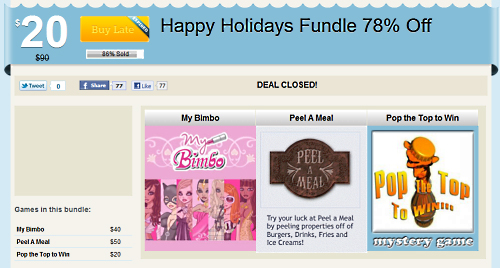创新交叉推广模式,CoinWhale推虚拟货币捆绑促销策略
自从Facebook关闭病毒式营销渠道后,游戏交叉推广就成了许多开发商的必然选项。针对这种现象,有一家名为CoinWhale的初创企业也从中嗅出了商机,在最近推出了与Applifier、AppStrip的广告条幅明显不同的交叉推广模式——虚拟货币捆绑促销。
据游戏邦了解,CoinWhale从AppSumo的运营模式中受到启发,将三种不同开发商的游戏虚拟货币绑定在一起,玩家只要购买了其中一种虚拟货币,就可以获赠另外两款游戏的虚拟货币。这三款指定的游戏均出自规模相称的开发商之手,他们会根据广告条幅、游戏内置广告、电子邮件广告等渠道创造的流量,进行相应的营收分成。
不过,原有的交叉推广告模式基本上按照1比1的流量创造营收,而CoinWhale的操作模式可能难以实现不同开发商之间的公平分成,因为会存在这种情况:一款游戏的虚拟货币并没有多少人付费购买,反而要向玩家大量免费派送。
不过CoinWhale并不存在这种担忧,认为有两个理由足以支撑这种运营模式:据该公司联合创始人布拉德·米尔斯(Brad Mills)所称,就好像电影发烧友一样每周都要去电影院转转,有不少游戏玩家都喜欢不断尝试新游戏,所以他们也有可能因为获赠了这些游戏的虚拟货币,就抱着尝鲜的心态去试试。
另一个更重要的理由是,小型公司如果要复制大型开发商交叉推广模式的成功,就不能不与其他公司组团作战,承担一定的试验风险。
事实证明,CoinWhale的这种策略还是取得了不俗的成果。首个推出虚拟货币捆绑促销活动的三款小游戏,每月活跃用户共达2万人,CoinWhale也因此收获了2500名独立访问用户,其中有1500人次得益于三款小游戏,剩下的1000人次则来自用户反向链接等其他流量。
游戏邦还发现,在这2500名访问者中,有550人注册成为CoinWhale网站用户,还有163人购买了售价20美元的虚拟货币,总共创收3260美元;访问者的付费转化率是6.5%,平均每名用户消费1.30美元。(本文为游戏邦/gamerboom.com编译,转载请注明来源:游戏邦)
CoinWhale Kicks Off Combo Deals for Virtual Currency in Social Games
Cross-promoting games on Facebook has become a big deal for many developers, since Facebook clamped down on its viral channels. We’ve just spoken to CoinWhale, the latest startup aimed at helping to cross-promote, although its idea is a bit different from the advertising bars being pushed by companies like Applifier and AppStrip.
CoinWhale takes inspiration from sales sites like AppSumo to offer a package deal on virtual currency to Facebook game players. But since any developer can offer a deal on currency in its own game, CoinWhale is bundling together games in threes.
The idea is to get three developers, who all have similarly-sized apps, to work together to lure in paying users. When a user of one of the games comes in to buy discounted virtual currency for that game, they’ll get a matching amount for free in the two other games.
If the sale works, the three games will share their pool of motivated, paying customers, which is typically only a tiny fraction of the overall playerbase. The developers will split the proceeds from the sale based on traffic to the sale from banners, in-game incitements and emails, with CoinWhale taking 10 percent off the top.
Existing cross-promo schemes mostly rely on a 1-to-1 exchange of traffic, and there’s no guarantee that CoinWhale can offer that here — one game could end up sending more of its precious, paying users out than it receives in return.
There are two arguments in favor of doing the deal anyway. Brad Mills, one of CoinWhale’s co-founders, says that there’s a pool of spending users who regularly try out new games, the way cinephiles go to a new movie every week. Those users will try out new games anyway; they might as well be directed.
The second, and more important argument, is that small developers need a way to replicate the cross-promotion schemes that much larger developers can use within their own networks of games, a feat that they can’t replicate without taking some risks and working with other companies.
And CoinWhale’s initial test of its concept showed fairly positive results. Testing with three small games that had a total of about 20,000 monthly active users, CoinWhale received 2,500 unique visits, of which the games drove about 1,500. User referrals and other traffic brought in the remaining 1,000.
Of that pool of 2,500 people, 550 registered as members of the site, and 163 purchased the $20 sale, bringing in $3,260. Overall, the conversion rate from visitors to buyers was 6.5 percent, with revenue of $1.30 per user.(source:insidesocialgames)








































 闽公网安备35020302001549号
闽公网安备35020302001549号